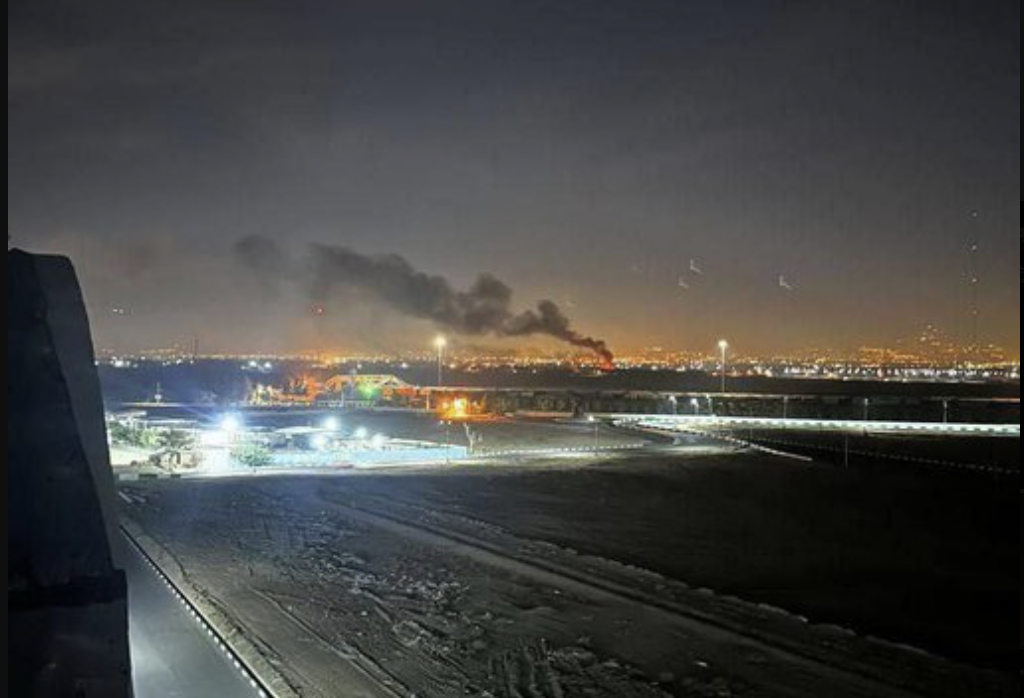In a dramatic pre-dawn operation Saturday, Israel launched airstrikes on Iranian military sites, a retaliatory move after Iran’s recent missile barrage against Israel. The Israeli Defense Forces (IDF) stated the strikes targeted missile production sites and surface-to-air missile systems in Iran. Though the strikes marked a bold move, Israel refrained from hitting oil or major missile facilities, signaling an attempt to limit escalation. Tehran reported “limited damage” and downplayed the attacks, with state-run media and officials claiming minimal casualties.

Explosions in Tehran Amid Escalating Tensions
Explosions echoed through Tehran as the airstrikes continued until dawn, with Iran’s military confirming the deaths of two soldiers, according to Al-Alam television. Iran’s Foreign Ministry condemned the attacks and asserted its right to self-defense. With rising regional violence, particularly involving Iran-backed groups like Hamas and Hezbollah, the airstrikes have pushed the two arch rivals closer to direct confrontation.
First Public Israeli Attack on Iranian Soil
Rear Adm. Daniel Hagari, a spokesperson for the IDF, stated Israel’s objectives in Gaza and Lebanon remained the focus but emphasized that Iran’s provocations could not go unanswered. The airstrikes mark Israel’s first openly acknowledged attack on Iranian territory, which had previously avoided sustained foreign military assault since its war with Iraq in the 1980s. Israeli Prime Minister Benjamin Netanyahu and Defense Minister Yoav Gallant monitored the operation from a military base in Tel Aviv, underscoring Israel’s commitment to retaliate against Iranian provocations.
Mixed Reactions to Israel’s Bold Move
The global response was swift. U.S. officials urged restraint, while British Prime Minister Keir Starmer cautioned Iran against escalating further. Meanwhile, regional powers like Saudi Arabia condemned Israel’s actions, decrying the strikes as violations of Iranian sovereignty and regional stability. Hamas, a known Iran-backed militant group, declared the airstrikes a direct assault on regional security. Israeli opposition leader Yair Lapid criticized the choice of targets, arguing for a more severe blow to Iran’s infrastructure.
Calculated Tactics Avoid Larger Escalation
Analysts believe Israel’s strategy aimed to send a decisive message while avoiding highly symbolic targets. Targeting air defenses in Iran also weakened Iran’s response capabilities without triggering a large-scale retaliation, experts suggest. Yoel Guzansky, a researcher at Tel Aviv’s Institute for National Security Studies, noted the precision strikes allow Iran to “save face” if it chooses restraint, avoiding further escalation for now.
Israel-Iran Hostility Now Moves Into Public Sphere
The animosity between Israel and Iran, dating back to the 1979 Islamic Revolution, has long been a shadow conflict, with Israel quietly disrupting Iran’s nuclear ambitions and Iran accused of backing attacks on shipping and regional adversaries. Recent escalations since October 7, when Hamas militants attacked Israel, killing over 1,200 civilians, have further strained the already volatile dynamic. The shadow war is now more overt than ever, with each side maneuvering amid heightened military tensions.
Rising Toll in Gaza Amid Widespread Violence
The Israeli government’s continued offensive in Gaza following the October 7 attack has led to heavy casualties, with over 42,000 reported deaths, mostly women and children, according to local health officials. While Israel’s focus remains on Hamas, the broader conflict with Iran has intensified, shifting the decades-long feud into a new phase that threatens wider regional stability.